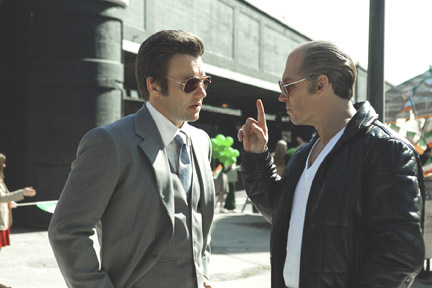The Toronto International film festival is so vast that it’s hard to get a handle on it. With a selection of 288 feature films, TIFF is really about a dozen festivals under the umbrella of one. A viewer can only hope to taste a slice of the programming. Even if festivalgoers intend on solely exploring, say, French films or music documentaries, they will have their hands full. It’s next to impossible for a film buff not to attempt to see as much as possible, food or sleep be damned, when there are so many options. Yet at some point, you just have to throw your hands in air and manage what you can.
One approach is to zero in on the gala presentations, an unofficial main slate of award season hopefuls trotted out for instant Twitter reactions (guilty as charged). These buzzed-about films are opening soon, if not already. (Black Mass, starring Johnny Depp, opened everywhere during the festival.) They are perhaps the better known among the hundreds of films here, though not necessarily among the best. Additionally, the movies discussed below should help answer a few questions about what to see in the next few months, whether you live in the West Village or Wisconsin.
Given that Ridley Scott’s The Martian shares the rah-rah triumphalism of Apollo 13 and the death-defying derring-do of Gravity, his adaption of Andy Weir’s novel has the potential to win merit apart from the outstanding—or, should I say, (inter)stellar—special effects, which are deployed in service of the story, never stealing the focus away from the survival drama at hand. (When actors-as-astronauts, such as Kata Mara and Jessica Chastain, glide weightlessly in their space shuttle, via wirework, it is a thing of beauty.)
As in Gravity, an American astronaut is stranded after an out-of-nowhere disaster, a sandstorm, forces the evacuation of a research mission. Instead of floating in outer space, though, the castaway is confined on Mars after his colleagues have left him for dead, assuming he was killed by blowing debris. Fortunately, Mark Watney (everyone’s kid brother Matt Damon) has supplies and food rations in the Mars base camp, but not enough until NASA can rescue him, which he calculates will be in four years. The story takes place over two years, which fly by in no time.
This is not a case of an existential crisis but of positive thinking prevailing over all obstacles. Watney immediately realizes that he has a limited food source, so he sets out to grow his own food in a makeshift hothouse. Putting his botany degree to use, he hauls in soil and plants seeds, fertilized by generous dollops of his excrement, and with a contraption out of a science fair, he produces water. All of his efforts should provide enough potatoes for the next three years. His mantra is to “science the shit out of” his predicament—People magazine’s 2007 Sexiest Man Alive proudly gets his geek on. A bit incredibly, Watney also has the smarts to perform surgery on his own abdomen, after the run-in with the flying antenna. (This is the rare instance where he, a man of few words, loses his restraint and drops the F-bomb.) With a base camp completely at his disposal and an entire planet to himself, Watney shares some of the self-deprecating glee of Will Forte in TV’s The Last Man on Earth.
This man is in an island, population: one. He records a video diary, talking to posterity and, noticeably, not to a higher power. Watney searches for solutions within himself, rarely losing his confidence. (The only obvious religious symbol, a wooden crucifix left behind by a colleague, is used as fodder for fire.) Instead of relying on suspense, the story focuses on science and solidarity, after ground control in Houston realizes that Watney has beaten the odds and survived. (To call Watney enterprising doesn’t quite cut it.) What the movie lacks in heart-pounding tension it makes up in its can-do spirit.
This might be the most calm space opera ever, buoyed by the “Aw, shucks,” good-natured Damon and the most eclectic cast in a recent studio film: Chiwetel Ejiofor as Dr. Vincent Kapoor, whose father is Hindu and his mother a Baptist (the film tries to cover all demographic bases); rogue whizz kid Donald Glover; and the wisecracking PR flack Kristen Wiig. It’s a workplace-cum-disaster movie. Egos and international rivalries are downgraded all for one goal: to bring Watney home. The apolitical camaraderie may be the story’s most fantastical element, and the disco-laden soundtrack matches the upbeat mood—the bass-heavy playlist was left behind on Mars by Captain Melissa Lewis (Chastain). Donna Summer reigns as if it’s 1979, although the filmmakers can’t resist some David Bowie.
Though the script jettisons a few of Mark’s trial-and-error episodes on the Red Planet, the film feels a little too long at 130 minutes. (One thing everyone can agree on, Gravity was fleet and compact.) But in a refreshing departure from many space movies, Watney’s private life is a void; no scenes of a girlfriend/wife receiving condolences, no towheaded tike asking, where’s daddy. Instead, his fellow crew members and the team millions of miles away in Houston are his family, making this special effects extravaganza surprisingly intimate.
After winning acclaim last year as Stephen Hawking in The Theory of Everything, Eddie Redmayne takes on an even more challenging and transformative role in The Danish Girl, director Tim Hooper’s gorgeous but conventionally told biopic of Einar Wegener, who in the 1930s was one of the first men to undergo a sex change operation. Set along the waterfront of Copenhagen or in Art Nouveau Parisian salons, the production design at times upstages the actors, as does one energetic Jack Russell terrier, who manages to stay still long enough for a reaction shot.
Based on David Ebershoff’s novel, the film opens in 1926 with sweeping views of Denmark’s mountainous coastline, the backdrop of Wegener’s landscape paintings. Einar and his wife, Gerda (Alicia Vikander), also a painter, live commission-to-commission in a spacious, robin egg blue Copenhagen apartment; color tones convey as much feeling as the script. Redmayne and Vikander are hemmed in by the declarative dialogue, which initially makes the couple’s banter seem more like the aim-to-please interactions of a first date: they are on their best behavior, making nice. Both husband and wife are a bit bland, except for when Gerda takes command at the aisle and directs a stuffy male model on how to pose. The film loosens up considerably when she asks him to substitute for a delayed model and pose in ballet slippers, silk stockings, and tulle. The instant Einar dons women’s ware, it’s as though a light (or, to be more period specific, a Victrola) has been turned on, and the new persona is nicknamed Lili.
Gerda’s role remains mostly reactive, with shades of Felicity Jones’s wifely role in Theory. At first, Gerda considers seeing her husband in women’s clothing a lark. However, she takes an assertive approach to Einar and later to the emerging Lili, which makes Gerda as complex as her husband. Not coincidentally, a nude red-head with a Mona Lisa-like smile bearing a strong resemblance to Lili begins appearing in Gerda’s work, boosting her career. Celebrating a sale, she comes home, approaches Einar from behind, and wraps her arms around him, thus discovering, and then caressing, her own cotton undergarments, which Einar wears underneath his shirt. For her, the revelation has an aphrodisiac effect.
Gerda, no bystander she, conspires with Einar to shock the attendees at the artists’ ball, where Einar appears as the willowy Lili, enhanced with many a beauty tip by Gerda. Introduced as Einar’s cousin, Lili is a shy coquette averting her gaze from the gaping men. The masquerade-as-a-prank painfully backfires, though, when Lili has suitors eager to fill her dance card, especially man-about-town Henrik (Ben Whishaw), who openly and aggressively courts Lili. Or is it Einar?
The screenplay, being very sensitive to the subject matter, carefully lets little go unexamined; it covers as much bases as possible within 120 minutes, while eschewing sexual labels for its characters, with the exception of Whishaw’s Henrik. The dialogue becomes particularly conversant with 2015 lingo. Einar: “It doesn’t matter what I wear, it’s what I dream. I dream Lili’s dreams.” To rebut any naysayers, he firmly states, “God made me a woman.” The film’s period details only go so far when Gerda, directing her exasperation at Lili’s willfulness, fires off with “Not everything is about you.”
Oddly, the rhythm of certain scenes doesn’t always flow when the editing cuts away to a superfluous detail. When the carefree couple drunkenly chatters loudly down a residential street in the middle of the night, someone hollers down at them to quiet down. Sure enough, the camera looks up to an angry, yelling man sticking his head out of the window. Likewise, director Tom Hooper overdoes it with the reaction shots; the overacting extras won’t win any awards for background players, if there were such an honor. There seems to be an enforced, uh, gaiety at any social gathering. Alexandre Desplat’s Michael Nyman-esque score also goes into overdrive, with fortissimo strings camouflaging the dry dramatic patches.
However, in a break from the period biopic formula, the film strays from decorum and takes risks, leaving little to the imagination about what a male-to-female surgical process entails, as well as giving Lili sexuality. In an intentionally awkward scene, both Lili and Gerda vie for the attention of art dealer Hans, played by hunk du jour Matthias Schoenaerts. Additionally, Lili unabashedly assumes a specific type of femininity, attempting to attain what might be an illusionary ideal. In the most daring sequence, Einar, in full male regalia, pays for a peep show at a brothel, watching a beautiful woman, under soft, rosy lighting, peel one layer of clothing after another. His studies her fluid hand gestures (think Norma Desmond as Salome, without the camp) and not the dancer’s lithe body.
Overall, Redmayne is most convincing in the quieter, dialogue-free moments, which are few and far in between, where Lili observes women or, with the slight tilt of the head, accepts a compliment. His thoughtful transition from the physically stiff Einar to the flirty Lili Elbe (named for the river) overrides the film’s flaws.
Whether as Einar or Lili, Redmayne is still recognizable. Buried under heavy makeup, Johnny Depp, though, looks radically altered in the blunt biopic Black Mass, where he has a field day as notorious mobster/FBI informer James “Whitey” Bulger. Director Scott Cooper stuffs a lot into a mere two hours. With so many characters and a time line of four decades, the material may have been better served as a miniseries. (Bulger’s years on the run might be on the editing room floor.) However, the dense drama offers one of the strongest ensembles of the year. Joel Edgerton’s preening and Boston accent are spot-on, and Dakota Johnson gives such a full performance that you may not realize she’s onscreen for only a few minutes. Depp—pale, blond, with a receding hairline and blue contact lenses—looks like he came off the set of Interview with the Vampire, but he sinks his teeth into the part, coolly and with maniacal glee. In a rarity for a studio film, he has not one but two monologues through which Bulger wields his power. Forget the hit jobs, these are the most on-the-edge-of-your-seat moments. Joe Berlinger’s investigative documentary Whitey: The United States of America v. James J. Bulger clarifies the details in Bulger’s rise and long reign in South Boston, particularly focusing on his trial and the shocking deals made for the government’s witnesses. (The FBI really doesn’t come well at all.)
Granted, this is just a narrow sampling of the festival. Also arriving in theaters this fall are other movies that received largely positive word of mouth. Cate Blanchett gives arguably her best film role in Truth, based on the 60 Minutes II/George W. Bush exposé debacle. The exquisite two-hander 45 Years with Charlotte Rampling and Tom Courtenay features something not commonly seen, an existential crisis from a woman’s point of view. Lastly, there’s the immensely likable stop-action animated Anomolisa, directed by Charlie Kaufman and Duke Johnson. A midlife crisis, this time of the male variety, has rarely been captured so humanly and smartly for an adult audience. In other words, expect full-frontal cartoon nudity. It was picked up by Paramount Pictures during Toronto and is scheduled for a late December release.










Leave A Comment